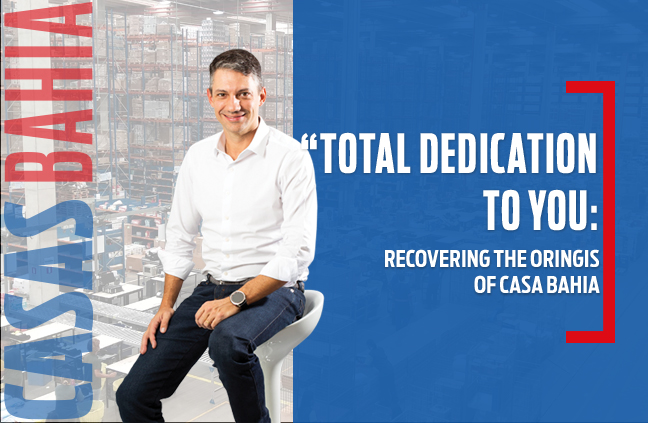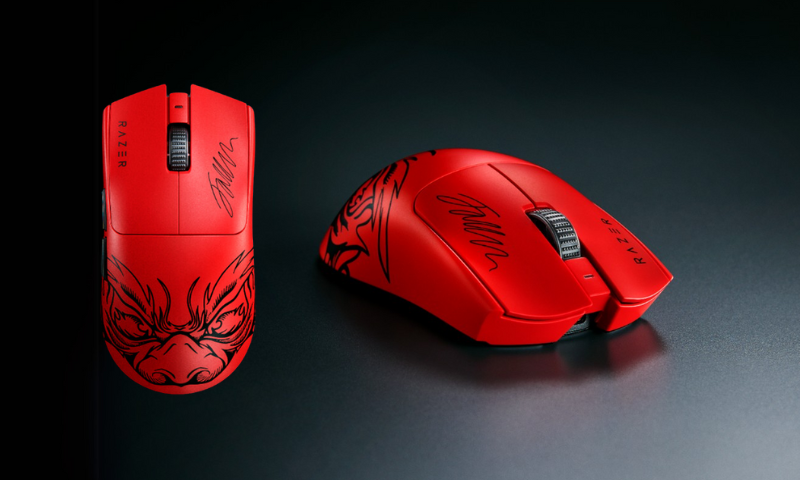
Cover Story / Casas Bahia
“Total Dedication to You”: The Revival of Casas Bahia’s Origins
With over 1,000 stores nationwide, the company, which has seen four consecutive quarters of growth, reconnects with customers through the slogan that defines its trajectory.
By Dilnara Titara e Igor Lopes

The Casas Bahia brand is one of the most emblematic in Brazilian retail, directly connecting with the aspirations and needs of real Brazil. At the helm of the company since May 2023, CEO Renato Franklin is leading the company toward the revival of its origins and strategic transformation.
In this interview, he explains how refocusing on furniture, home appliances, and technology has driven the brand forward and solidified its position as an industry reference. He shares challenges, lessons learned, and steps to balance expansion with efficiency. He also provides a clear vision of the future of retail and the role of Casas Bahia in democratizing access to credit.
CASAS BAHIA IN NUMBERS
- 72 years of history
- More than 1,000 stores
- Presence in over 500 municipalities in 22 Brazilian states
- 35,000 employees
- 108 million customers
- 25 distribution centers
- Sales: 60% in physical stores, 40% online
- 50% of sales come from home appliances
- Revenue: R$ 40 billion (2023)
How has this return to its origins influenced the company’s current strategies?

RENATO FRANKLIN – Casas Bahia has 72 years of history and truly serves real Brazil. It caters to class A but also to classes B, C, D, and E. There are 108 million customers, almost 95% of Brazil’s economically active population. Returning to our essence is fundamental for two major reasons. First, it’s where our strength lies. We were born selling furniture, home appliances, and technology equipment. And, of course, during the pandemic, with this reach and brand strength, came the desire to try to do everything. But then, the competition became very expensive, and it’s difficult to profit from selling low-ticket items. So, we changed our strategy, returning to furniture, home appliances, technology, televisions, cell phones, and notebooks. The beginning is always a challenge since we reduced the company’s revenue by 14%. In contrast, we have grown 30% in furniture, 20% in home appliances, 20% in cell phones, and televisions continue to be the flagship product we have been leading in Brazil for quite some time. The company has seen four consecutive quarters of growth, with improved margins and serving the population with this strong and beloved brand. The slogan “Total Dedication to You” undoubtedly helps with reconnection. I believe that from a marketing and awareness standpoint, we have grown significantly.
What happened along the way? Was there an excessive bet on technology for an audience that wasn’t ready yet? What might have gone wrong?
RF – Actually, my mandate is to have capital allocation discipline. So, it works almost like an investment fund. I analyze each business in the company and each sales channel. If it has a margin, we continue; if not, we stop. So, looking at the businesses we had, some categories, especially in e-commerce, had a negative margin at the bottom line. Because, initially, it seems like you’re making money, but there’s a logistical cost to delivering to the customer’s home, free shipping, and interest-free installments. I think the previous strategy was very much based on the logic of “let’s grow first and profit later.” We changed that to “let’s profit first and then grow.” And then we focused on what we truly have strength and scale in. In physical stores, I have a slightly higher margin. We sell services along with products and have our financing system, which helps. The financing option has a 26% penetration in physical stores. Online, the historical penetration was 2.3%. So, it’s harder to contribute to profitability. Recently, we managed to increase financing penetration in digital sales to almost 10%. This will also allow us to grow in e-commerce. The company was previously 50% physical stores and 50% e-commerce; today, it is 60% physical stores and 40% e-commerce. E-commerce started growing again in the fourth quarter of 2024. We expect to maintain roughly this 60% – 40% split, with slightly more growth in physical stores than in e-commerce in the coming years.
What are the biggest challenges in this journey, and how has the company transformed to remain relevant in such a competitive market?
RF – It has changed several times, and I think the biggest challenge is maintaining culture. The first lever of our strategic plan is this revival of Casas Bahia’s culture. So, we went back to our origins, total dedication to the customer, with strong store performance, the entire corporate team thinking and living in that environment, exchanging information with salespeople. This brings a very clear focus on the customer, commitment to profitability, and simplicity. Retail needs to be simple. The company is huge, with more than BRL 40 billion in GMV, more than 35,000 employees, the largest logistics network in Brazil, 25 distribution centers, and extensive financing operations, but it must remain simple.

What is your expansion plan?
RF – The main plan is focusing on operational efficiency and growing the existing structure. Yes, we are opening some stores, but the strong expansion plan begins after 2025, at the beginning of 2026, once we have streamlined operations and have free cash flow robust enough to support a Capex for expansion. There are about 200 cities where we see potential for a store, as well as some of the 500 where we are already present. We want to gain more market share in the Northeast, Midwest, and South of Brazil, where there is still a lot of growth potential.
“Previously, the company was 50% physical stores and 50% e-commerce. Today, it is 60% physical stores and 40% e-commerce. E-commerce returned to growth in Q4 2024. We expect to maintain this 60% – 40% split, with slightly stronger growth in physical stores compared to e-commerce in the coming years.”
How are you balancing this expansion with operational efficiency, especially in a challenging economic environment like ours?
RF – When you achieve commercial scale with suppliers to bring competitive pricing to products while still maintaining a margin to cover company costs, we can grow. One aspect that helps us is seeing the transformation of the home appliance industry in Brazil. We’ve seen the entry of several new players, especially the arrival of Chinese manufacturers, bringing innovations and significant investments to boost the market. They invest heavily in physical stores to improve displays and provide a better customer experience, which in turn encourages the manufacturers already established in Brazil both international and domestic to also invest and bring new innovations. This entire movement stimulates asset renewal, so consumers see a more energy-efficient refrigerator and want to upgrade, a television with artificial intelligence, a smartphone with a better camera and more storage. Many products are arriving at lower prices than in previous years with more advanced technology. This allows us to always innovate, renew, and drive growth. We still see that a large part of the Brazilian population wants to upgrade, has income, but needs flexibility to pay. That’s why financing plays a key role in growth. It is very strong and has been an important lever in enabling the company’s growth, even in a more challenging economic environment with high interest rates.
When you mention financing, we remember a song by Mamonas Assassinas: “My happiness is Casas Bahia’s financing.”
RF – There are many spontaneous songs, which is cool. There are several songs in Brazilian popular culture that mention Casas Bahia’s financing. Casas Bahia is a brand of the Brazilian people. We have been Top of Mind for 19 consecutive years in home appliances and are the most recognized brand across all industries in Southeast Brazil.

Is it a positive aspect that you have returned to the Casas Bahia name? Does it reinforce trust?
RF – Exactly, and it resonates with our consumer audience. When you have one identity for speaking to the capital markets, which was Via, and another that speaks to the consumer, you lose the opportunity for an institutional conversation like ours, to talk about our brands that have been in the hearts of Brazilians for generations.
Have you been investing in Retail Media? How does this area fit into your business vision, and what are the objectives in this segment?
“Retail Media is a major growth driver for the retail industry. In developed countries, some retailers generate up to 50% of their revenue from Retail Media. Our goal is not that high, but we believe that reaching a single-digit penetration rate, even at 4%, would be transformational for the company.”
RF – Retail Media is an important lever for retail. In more developed countries, there are retailers that generate 50% of their revenue from Retail Media. Our plan is not on that scale. We are aiming for a single-digit penetration rate. In the long term, if we reach 4%, it will already be transformative for the company. We started recently, launching our platform in March 2024, and we consider it the most complete on the market because it truly integrates omnichannel capabilities. We have strong assets and properties in e-commerce, we work heavily with CRM, selling to our customer base to create targeted promotions for specific customer segments. We also leverage our more than 1,000 physical stores, where we have over 50,000 digital screens, allowing us to display advertisements from manufacturers and suppliers directly at the point of sale. When combining physical store advertising, e-commerce, and data monetization, the potential is enormous. The return for suppliers is also very strong, as they reach customers who are already at the final stage of the purchase journey. The customer walks into the store ready to buy, and the brand then can influence their choice by highlighting product features. This year, Retail Media will generate hundreds of millions of reais in revenue, with a margin of nearly 80%, and we see potential to at least double it next year.
What do you see as the main challenges and opportunities for the sector in the coming years?
RF – I believe the key focus will be customer experience. Customers still want physical stores, and they continue to be a major driver of sales. When we talk about high-value products, like a TV or refrigerator costing BRL 5,000 or more, the customer wants to see and interact with the product before deciding. Additionally, customers often need guidance, as there are millions of television models, for example. They know they want a TV, but they have questions about which one suits their needs. Is it for a bright or dark environment? Do they need specific features? Is it for gaming, watching sports, or streaming series? For each type of use, there is an ideal product for cost-benefit. Our sales team plays the role of product consultants. And I believe retail must continue evolving toward an enhanced customer experience, ensuring we constantly introduce new innovations and make the buying process as smooth as possible. Without a doubt, this has been one of Casas Bahia’s strongest competitive advantages. Looking at e-commerce sales, nearly 25% of transactions are influenced by our salespeople communicating with customers via WhatsApp, helping them choose the best product. So, I believe the key drivers for success will revolve around customer experience, competitive pricing, and flexible payment options.

How do you envision Casas Bahia in the next five to ten years, and what major milestones do you hope to achieve during your leadership?
RF – We have a very clear vision for the company. We are leaders in home appliance sales, and we want to remain the best retailer in home appliances and furniture in Brazil. We aim to be the top reference and first choice for consumers, offering a seamless, straightforward, and personalized shopping experience across all channels. We have a very strong leadership position in the Southeast region. In São Paulo and Rio de Janeiro, for example, although we are growing and gaining market share, our share is already very high. However, in the Northeast, Midwest, and South, the potential for growth is significantly larger. These regions will see stronger store expansion as we work to match the market share levels we have in the Southeast.
What are the major milestones you want to leave as your legacy?
RF – I believe the most important milestone is to improve the company’s profitability through greater operational efficiency. This will allow us to become more competitive in credit offerings. Today, the cost of credit in Brazil is very high, whether due to interest rates or operational costs. If we become more efficient, we can offer lower-cost credit to the consumers who need it most. Another major milestone is returning to strong growth and generating jobs. True social inclusion comes through formal employment. It provides dignity, enables people to achieve their dreams, and ensures a stable future for families. These are the two main legacies I would like to leave.
What message would you like to share with retail professionals who follow Casas Bahia’s trajectory and seek inspiration for their own businesses?
RF – More than just being optimistic, we need to recognize opportunities. We are in a challenging macroeconomic environment, but I believe Brazilians tend to complain more than necessary. The past ten years have been tough for the Brazilian economy, yet there are many examples of companies that have achieved solid and sustained growth. In the past year, Casas Bahia faced the same market challenges as everyone else. The macroeconomic conditions were difficult, and on top of that, we made the hard decision to exit some product categories and slightly reduce the company’s size. Even so, we successfully gained operational efficiency and increased margins. We have now completed four consecutive quarters of growth, with significant expansion in our core product categories. This proves that Brazil is full of opportunities. With hard work and discipline, we can capture these opportunities, generate value for stakeholders, create jobs, and contribute to people’s growth and prosperity.
“Challenges and opportunities for the sector will revolve around customer experience. When it comes to high-value products, TVs, for example, priced at BRL 5,000 or more customers want to visit a physical store and see the product before deciding. Sometimes they also need assistance, as there are millions of television models available.”
Source: Eletrolar News ed. 165





